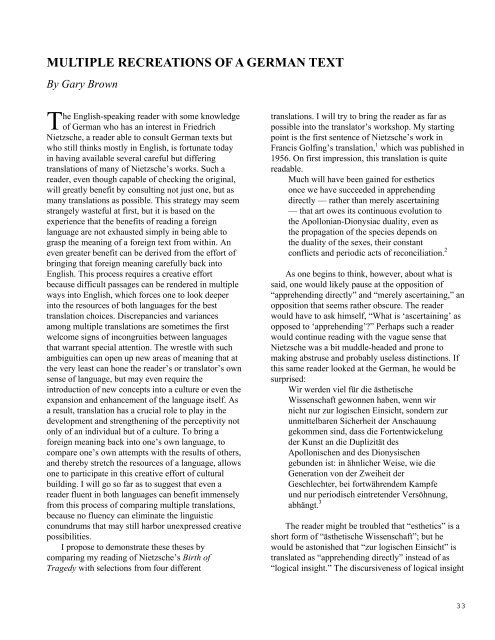their - The University of Texas at Dallas
their - The University of Texas at Dallas
their - The University of Texas at Dallas
Create successful ePaper yourself
Turn your PDF publications into a flip-book with our unique Google optimized e-Paper software.
MULTIPLE RECREATIONS OF A GERMAN TEXT<br />
By Gary Brown<br />
T<br />
he English-speaking reader with some knowledge<br />
<strong>of</strong> German who has an interest in Friedrich<br />
Nietzsche, a reader able to consult German texts but<br />
who still thinks mostly in English, is fortun<strong>at</strong>e today<br />
in having available several careful but differing<br />
transl<strong>at</strong>ions <strong>of</strong> many <strong>of</strong> Nietzsche’s works. Such a<br />
reader, even though capable <strong>of</strong> checking the original,<br />
will gre<strong>at</strong>ly benefit by consulting not just one, but as<br />
many transl<strong>at</strong>ions as possible. This str<strong>at</strong>egy may seem<br />
strangely wasteful <strong>at</strong> first, but it is based on the<br />
experience th<strong>at</strong> the benefits <strong>of</strong> reading a foreign<br />
language are not exhausted simply in being able to<br />
grasp the meaning <strong>of</strong> a foreign text from within. An<br />
even gre<strong>at</strong>er benefit can be derived from the effort <strong>of</strong><br />
bringing th<strong>at</strong> foreign meaning carefully back into<br />
English. This process requires a cre<strong>at</strong>ive effort<br />
because difficult passages can be rendered in multiple<br />
ways into English, which forces one to look deeper<br />
into the resources <strong>of</strong> both languages for the best<br />
transl<strong>at</strong>ion choices. Discrepancies and variances<br />
among multiple transl<strong>at</strong>ions are sometimes the first<br />
welcome signs <strong>of</strong> incongruities between languages<br />
th<strong>at</strong> warrant special <strong>at</strong>tention. <strong>The</strong> wrestle with such<br />
ambiguities can open up new areas <strong>of</strong> meaning th<strong>at</strong> <strong>at</strong><br />
the very least can hone the reader’s or transl<strong>at</strong>or’s own<br />
sense <strong>of</strong> language, but may even require the<br />
introduction <strong>of</strong> new concepts into a culture or even the<br />
expansion and enhancement <strong>of</strong> the language itself. As<br />
a result, transl<strong>at</strong>ion has a crucial role to play in the<br />
development and strengthening <strong>of</strong> the perceptivity not<br />
only <strong>of</strong> an individual but <strong>of</strong> a culture. To bring a<br />
foreign meaning back into one’s own language, to<br />
compare one’s own <strong>at</strong>tempts with the results <strong>of</strong> others,<br />
and thereby stretch the resources <strong>of</strong> a language, allows<br />
one to particip<strong>at</strong>e in this cre<strong>at</strong>ive effort <strong>of</strong> cultural<br />
building. I will go so far as to suggest th<strong>at</strong> even a<br />
reader fluent in both languages can benefit immensely<br />
from this process <strong>of</strong> comparing multiple transl<strong>at</strong>ions,<br />
because no fluency can elimin<strong>at</strong>e the linguistic<br />
conundrums th<strong>at</strong> may still harbor unexpressed cre<strong>at</strong>ive<br />
possibilities.<br />
I propose to demonstr<strong>at</strong>e these theses by<br />
comparing my reading <strong>of</strong> Nietzsche’s Birth <strong>of</strong><br />
Tragedy with selections from four different<br />
transl<strong>at</strong>ions. I will try to bring the reader as far as<br />
possible into the transl<strong>at</strong>or’s workshop. My starting<br />
point is the first sentence <strong>of</strong> Nietzsche’s work in<br />
Francis Golfing’s transl<strong>at</strong>ion, 1 which was published in<br />
1956. On first impression, this transl<strong>at</strong>ion is quite<br />
readable.<br />
Much will have been gained for esthetics<br />
once we have succeeded in apprehending<br />
directly — r<strong>at</strong>her than merely ascertaining<br />
— th<strong>at</strong> art owes its continuous evolution to<br />
the Apollonian-Dionysiac duality, even as<br />
the propag<strong>at</strong>ion <strong>of</strong> the species depends on<br />
the duality <strong>of</strong> the sexes, <strong>their</strong> constant<br />
conflicts and periodic acts <strong>of</strong> reconcili<strong>at</strong>ion. 2<br />
As one begins to think, however, about wh<strong>at</strong> is<br />
said, one would likely pause <strong>at</strong> the opposition <strong>of</strong><br />
“apprehending directly” and “merely ascertaining,” an<br />
opposition th<strong>at</strong> seems r<strong>at</strong>her obscure. <strong>The</strong> reader<br />
would have to ask himself, “Wh<strong>at</strong> is ‘ascertaining’ as<br />
opposed to ‘apprehending’” Perhaps such a reader<br />
would continue reading with the vague sense th<strong>at</strong><br />
Nietzsche was a bit muddle-headed and prone to<br />
making abstruse and probably useless distinctions. If<br />
this same reader looked <strong>at</strong> the German, he would be<br />
surprised:<br />
Wir werden viel für die ästhetische<br />
Wissenschaft gewonnen haben, wenn wir<br />
nicht nur zur logischen Einsicht, sondern zur<br />
unmittelbaren Sicherheit der Anschauung<br />
gekommen sind, dass die Fortentwickelung<br />
der Kunst an die Duplizität des<br />
Apollonischen and des Dionysischen<br />
gebunden ist: in ähnlicher Weise, wie die<br />
Gener<strong>at</strong>ion von der Zweiheit der<br />
Geschlechter, bei fortwährendem Kampfe<br />
und nur periodisch eintretender Versöhnung,<br />
abhängt. 3<br />
<strong>The</strong> reader might be troubled th<strong>at</strong> “esthetics” is a<br />
short form <strong>of</strong> “ästhetische Wissenschaft”; but he<br />
would be astonished th<strong>at</strong> “zur logischen Einsicht” is<br />
transl<strong>at</strong>ed as “apprehending directly” instead <strong>of</strong> as<br />
“logical insight.” <strong>The</strong> discursiveness <strong>of</strong> logical insight<br />
33

















